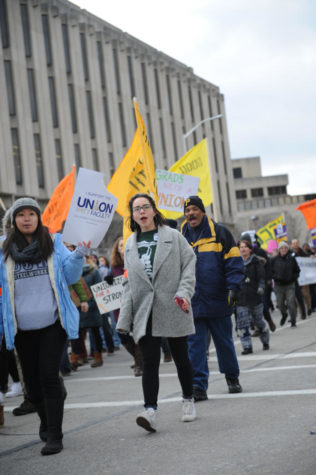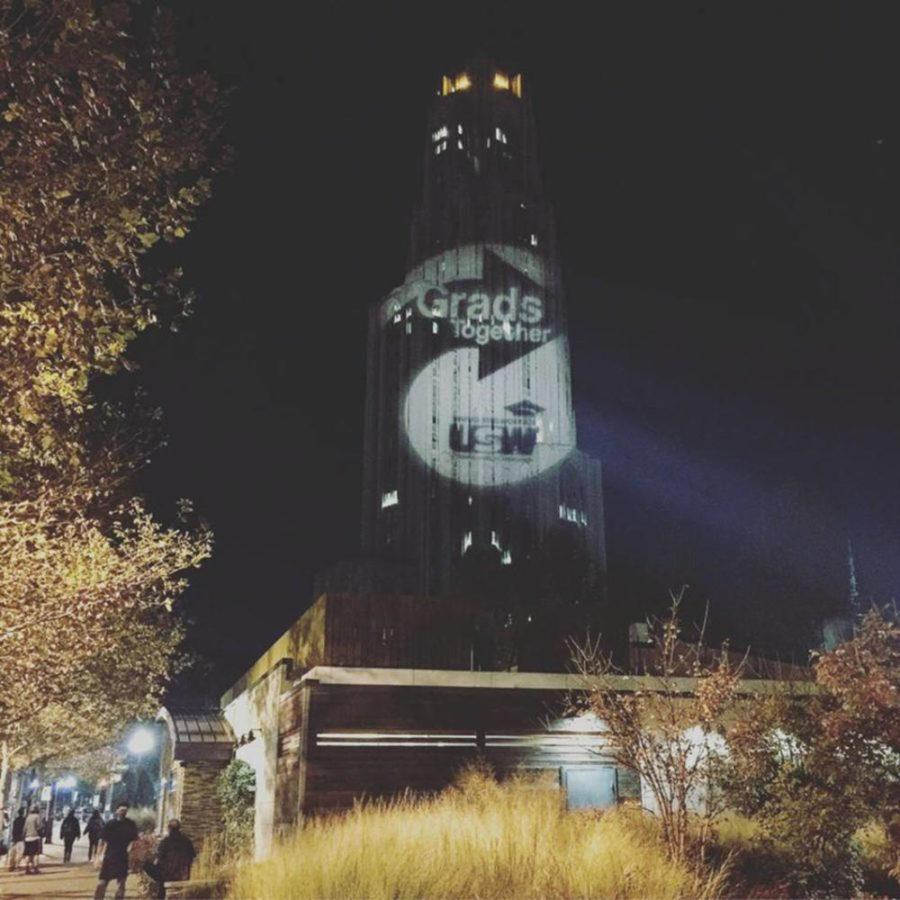Rachel Coombs was conducting research in a biology lab in late July when she found herself enraged by an email from Pitt Provost Patricia Beeson.
Coombs, a Ph.D. student studying biological sciences, read Beeson’s letter outlining the Pitt administration’s opposition to the grad student union efforts. Beeson said the union wouldn’t be in the best interests of students and that “education, not the financial support, is the goal of graduate study.”
“I felt like they were trying to segregate us while trying to unite us under the big umbrella of academia,” Coombs said. “It was very offensive to have someone tell us that money shouldn’t be important when a lot of us are drowning in debt and there are grad students that can’t make ends meet.”
After her initial anger, the administration’s response drove her to seek out the Graduate Student Unionizing Committee — a group of Pitt students pushing for a union — and become a volunteer.
Since grad student organizers announced the plan to push for unionization in January 2016, the committee has worked to gather support for a vote through authorization cards — working in partnership with the United Steelworkers. The University was quiet on the issue, expressing neither support or opposition, until Beeson’s July 27 letter and Pitt’s webpage detailing the administration’s position.

Pitt spokesperson Anthony Moore further explained Pitt’s opposition in an Aug. 10 email to The Pitt News. Moore said the current “shared governance model currently in place at Pitt — which allows for both the individual and collective voice of graduate students to be heard — would be adversely impacted by a union.”
Moore outlined the financial value of a typical Ph.D. package, which includes tuition, health insurance and a stipend for teaching or research. Pitt values this package at $44,600 per year for an in-state student working as a teaching assistant in the Dietrich School of Arts and Sciences and $58,700 for an out-of-state student. Of this total, teaching assistant stipends total $18,450 per year for an Arts and Sciences grad student, according to a Pitt webpage.
Moore did not respond to questions asking how Pitt specifically determined the union would be harmful to students, instead repeating the administration’s claim that a union would limit student voices.
Another criticism Pitt outlined on the webpage states that an outside organization — in this case the United Steelworkers — would interfere with the relationship between faculties and students. Beth Shaaban, a student organizer and Ph.D. student studying epidemiology, said that’s a common sentiment, but she disagrees.
“It’s going to free up the mentor and mentee relationship. The real relationship that is changing is the boss and the worker — the administration and the students,” she said.
Julie Van Gyzen, a music history Ph.D. student, joined the committee last September after meeting with students involved in the organizing efforts. Upon reading Beeson’s letter, she said she was uncertain why Pitt came out against the union instead of remaining impartial.
“It was disappointing that the administration decided to not remain neutral. It should be up to the grad students to decide whether they want a union or not,” she said.
Van Gyzen sees a number of widespread issues — such as low pay and a lack of transparency in decision-making — that she would like the administration to be held accountable for.
“The will of the grad students voice should be the loudest voice,” she said. “If it happens to be no, then fine. If it happens to be yes, then the administration should really respect that decision.”
And though Beeson said she had “not learned of any single, widespread concern driving students to favor unionization,” the organizers seem united in their concerns. Like Van Gyzen, Shaaban cited pay and benefits as an issue, along with a lack of transparency from the administration.
Though the letter led to some negative reactions from grad organizers, Shabaan said the biggest outcome was facilitating more conversation about the union and its potential effects.
“It’s generated some good conversation, it’s caused people to come and ask us good questions — if anything, we’ve been talking to more people about it since everyone’s received the email,” she said.
Shabaan wants the goal of the union to be the recognition of grad students as employees, not just students.
“We love the University of Pittsburgh,” she said, adding that Pitt relies heavily on grad student work. “Without us, the University wouldn’t get this work done.”
Editor’s note: This story has been edited to clarify that the stipend amount for TAs came directly from a Pitt webpage, not from Anthony Moore.



